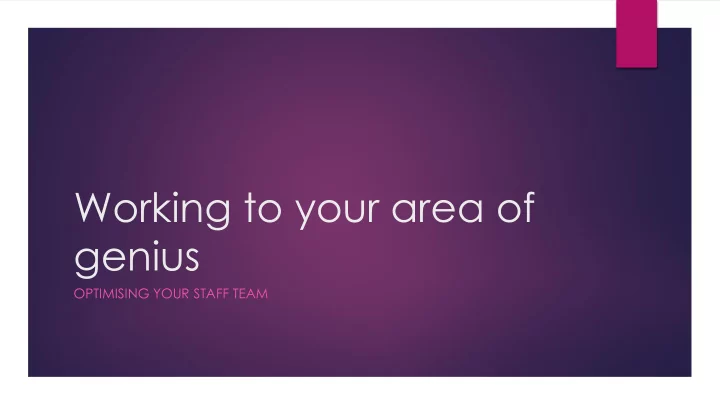

Working to your area of genius OPTIMISING YOUR STAFF TEAM
Introductions…. Jeanne Barczewska Introducing two of ‘my’ genii ! Senior Lecturer UoN Michelle Bugby - creativity Programme Lead for EY Foundation Degree Penny Melville – organised/thorough Programme lead GEB route to EYTS Both – supportive Formerly: Quality and Development Manager (44 settings) Nursery/Creche/Holiday Club Owner EY Trainer and Consultant Teacher: Primary, Secondary (PE) and SEN (MLD behaviour) Sales Exec.
Aim of the workshop To explore the utilisation of ‘genius’ in the work place with special consideration to the early years context To consider YOUR area of genius To question how well you know your team and their areas of genius To consider the impact of recruitment – challenges and barriers To consider the benefits (to children) of working within a team which maximizes areas of genius
Feedback from one who knows! “Hi Jeanne – This is exciting stuff. So glad you’re working on it and rolling out. It’s had a massively positive impact for us here at work and in our lives generally .” Jim Hall, CFA Chairman, Chief Investment Officer
Understanding organisations ‘Your organisation is not different, because it depends on people, and it is that dependence on people that makes you and your organisation far more similar to, and dissimilar from, your counterparts and their organisations elsewhere’ Autry (2004 p.xviii )
People create (and maintain) success ‘If the only lesson you learn from [ High Performing Investment Teams – the source * ] is that people are crucial to long term success, you will be ahead of the game and your competition’ * Mauboussin [ND] (cited in Ware and Dethmer)
Let’s talk about ….. Competition Finance People Is there anything wrong with the list above?
Competition Finance People Good practice Good business
‘Balance is key’ "Better learn balance. Balance is key. Balance good, karate good. Everything good. Balance bad, better pack up, go home. Understand?" Mr. Miyagi The Karate Kid 1984) https://www.google.co.uk/search?q=balance+karate+kid+quote&espv=2&biw=1707&bih=792&source=lnms&tbm=isch&sa=X&ved=0ahUKEwjQzeqov6vSAhWoJMAKHZESAPY Q_AUIBigB&dpr=0.8#imgrc=SCshIOCADoyGBM:
Area of ‘genius’ Maximising your contribution * * Ware and Dethmer (2006)) Exceptional intellectual or creative power or other natural ability. ‘she was a teacher of genius’ An exceptionally intelligent person or one with exceptional skill in a particular area of activity. ‘a mathematical genius’ https://en.oxforddictionaries.com/definition/genius
Exploration, discovery and lightbulb moments! Table of genius! Map out your thoughts as a group Are you working to your area of genius? How much time are you able to do this? https://www.google.co.uk/search?q=light+bulb+moments&espv=2&biw=1707&bih=792&source=lnms&t bm=isch&sa=X&ved=0ahUKEwjdttfjx6vSAhVkDcAKHXm6AKIQ_AUIBigB
Now: Look at ‘team genius’ Identify members of staff and their skills Examine how many you know well What evidence is there to support your knowledge of their skills, abilities and interests? Are they being utilised and if so how?
Barriers and challenges Current staffing Future recruitment Retention Motivation Emotional well-being Occupancy
Reflection and action: IMPACT What …. are the (immediate) issues? So what …… can I do about this? Now what …… do I need to do next? What might someone else need to do? Borton (1970) https://www.google.co.uk/search?q=what+so+what+now+what+reflective+model&espv=2&biw=1707&bih=792&tbm=isch&imgil=7hUHwwXpFqP7nM%253A%253BW8O_TE8gucoTZM%253Bhttp%25253A%25252F %25252Fwriteonline.ca%25252Freflective- essay.php%25253Fcontent%2525253Dsection2&source=iu&pf=m&fir=7hUHwwXpFqP7nM%253A%252CW8O_TE8gucoTZM%252C_&usg=__95yqNWGYHiuXvRxn39sBO0oEW2I%3D&dpr=0.8&ved=0ahUKEwiJmPaoy KvSAhUsDcAKHSHIDdcQyjcIRQ&ei=-qKxWImzKayagAahkLe4DQ#imgrc=7hUHwwXpFqP7nM:
‘Genius’ your place to shine Keys to finding genius ‘gifts’ Success Delight Creativity Ease Feedback Fulfilment Ware and Dethmer (2006) p142
Quadrant tool ‘Once we intend to live in our genius, we begin to notice all the interference and competition for our time that, previously, went completely unnoticed’ Ware and Dethmer (2006) p150 Quadrant exercise
In conclusion Findings: (Ware and Dethmer 2006) By maximising the contributions from everyone work can be distributed according to area of excellence or genius 1. People more engaged in their work – increased efficiency and creativity leading to better output (and in the case of children – better outcomes) 2. Staffing needs become obvious – e.g. tasks that no-one wants indicate the need to employ someone for whom these tasks lie in their genius quadrant e.g. should all settings employer someone in the role of ‘house keeper’? ‘Genius is a very powerful and overlooked concept’ ‘The shift to genius can be challenging – it demands courage’
Thank you for listening Research opportunity - Interested in following this up? We would love to know how you get on - if you decide to ‘ commit ’! Contact: Jeanne.Barczewska@northampton.ac.uk
References Autry, J. (2004) The servant leader. New York : Three Rivers Press Borton, T. (1970) Reach, touch and teach . london: hutchinson Ware, J., and Dethmer, J. (2006) High performing investment teams. New Jersey: John Wiley & Sons
Recommend
More recommend